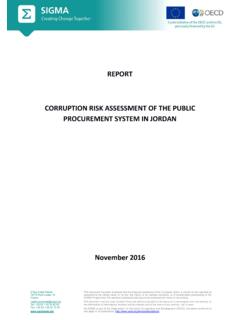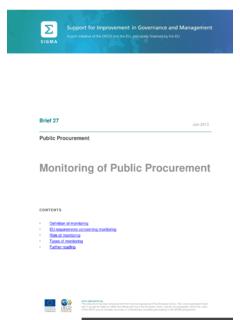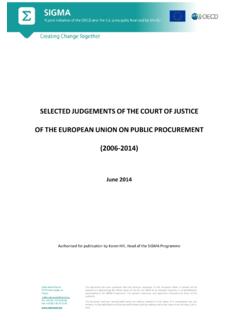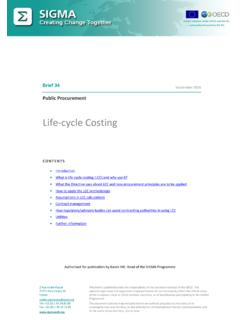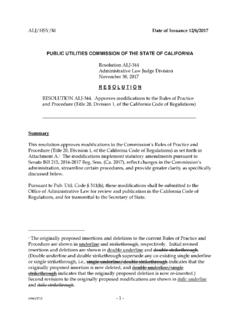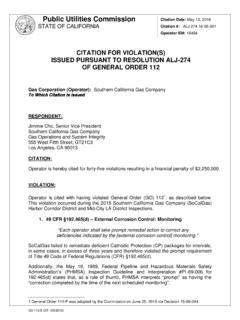Transcription of Public Procurement in the EU: Legislative Framework, Basic ...
1 2 Rue Andr Pascal 75775 Paris Cedex 16 France Tel: +33 (0) 1 45 24 82 00 Fax: +33 (0) 1 45 24 13 05 This brief is published under the responsibility of the Secretary-General of the OECD. The opinions expressed and arguments employed herein do not necessarily reflect the official views of the European Union or OECD member countries, or of beneficiaries participating in the SIGMA Programme. This document and any map included herein are without prejudice to the status of or sovereignty over any territory, to the delimitation of international frontiers and boundaries and to the name of any territory, city or area. Brief 1 Public Procurement Public Procurement in the EU: Legislative Framework, Basic Principles and Institutions CONTENTS General context Scope of the Directives Legal effect of the Directives Basic principles of Public Procurement .
2 Competition, equal treatment and non-discrimination, transparency Role of European institutions Further information Authorised for publication by Karen Hill, Head of the SIGMA Programme September 2016 SIGMA| Public Procurement Brief 1 2 General context To understand the basics of Public Procurement in the European Union (EU), it is necessary to look at the Procurement Directives themselves as well as the context in which they were adopted. Even with the Directives in place, more general provisions contained in the Treaty of Rome and more general principles of law will apply and will guide the interpretation of the Directives. It is also important to understand the role of the various EU institutions.
3 Treaty on the Functioning of the European Union (TFEU)1: The TFEU does not include any explicit provisions relating to Public Procurement . It does establish, however, a number of fundamental principles (Treaty principles) that underpin the EU. Of these fundamental principles, the most relevant in terms of Public Procurement are the following: prohibition against discrimination on grounds of nationality; free movement of goods; freedom to provide services; freedom of establishment. General Principles of Law: In addition to these fundamental Treaty principles, some general principles of law have emerged from the case law of the Court of Justice of the European Union (CJEU).
4 These general principles of law are important because they will often be used by the CJEU to fill in gaps in the legislation and to provide solutions to situations that are often very complex. The most important of these general principles of law in the Procurement context are the following: equality of treatment; transparency; mutual recognition; proportionality. These general principles apply independently of the Directives so that, even if the Directives do not apply, the principles may still apply to the Procurement and award of contracts by contracting entities. EU Directives: To underpin the Treaty principles in the field of Public Procurement and to provide the necessary guidance to Member States, the EU has adopted a series of Procurement Directives.
5 The most recent Procurement Directives (2014 Directives), which cover predominantly procedural issues, are the following: Public Sector Directive 2014/24/EU replacing Directive 2004/18/EC2; Utilities Directive 2014/25/EU replacing 2004/17/EC3 ; Concessions Directive 2014/23/EU4, which creates a new regulated regime for the award of works and services concession contracts. The deadline for the transposition of these three directives by Member States into their domestic law was 18 April 2016. 1 Treaty on the Functioning of the European Union consolidated version of the Treaty on the Functioning of the European Union, Official Journal of the European Union (OJEU), C 326, 26 October 2012.
6 2 Directive 2014/24/EU on Public Procurement and repealing Directive 2004/18/EC, 26 February 2014. 3 Directive 2014/25/EU on Procurement by entities in the water, energy, transport and postal services sectors and repealing Directive 2004/17/EC, 26 February 2014. 4 Directive 2014/23/EU on the award of concession contracts, 26 February 2014. SIGMA| Public Procurement Brief 1 3 Two remedies Directives apply to complaints and review: the Public sector remedies Directive 89/665/EC and the utilities sector remedies Directive 92/13/EC5. These two remedies Directives were both significantly amended by Directive 2007/66/EC6. In addition, the defence Directive 2009/81/EC7 applies a more flexible and confidential regime to the Procurement of military supplies and related works and services.
7 The European Commission has supplemented these Directives by further legislation dealing with various aspects of the Procurement process. Scope of the Directives The Directives do not seek to impose a common regulatory regime on EU Member States in the field of Procurement , and Member States can continue to apply their national procedures as adapted to the Directives. They thus permit Member States to maintain or adopt substantive and procedural rules to the extent that these rules are not in conflict with the Directives or with Treaty provisions. As a result, Member States remain free to regulate a number of issues, mainly practical matters.
8 In essence, the common rules of the Directives consist of applying the Basic principles, notably non-discrimination, equal treatment and transparency in the following areas: publicity of proposed Procurement contracts; design of technical specifications; choice of Procurement procedure; qualification and selection of candidates and tenderers; award of contracts. Rather than seeking to regulate with precision all Public Procurement contracts within the EU, the EU legislator chose to regulate in the Directives only those contracts that were most clearly capable of affecting trade between Member States. Those falling within this broad definition include the following: contracts that are of a sufficiently high value to attract economic operators from other Member States ( where the potential benefits of winning the contract outweigh the extra costs of providing the goods, works or services from a greater distance); contracts concerning objects that are amenable to cross-border trade.
9 Legal Effect of the Directives Member States are bound to take all appropriate measures to ensure the fulfilment of the obligations arising out of the Treaty or resulting from actions taken by the institutions of the EU. The Directives, like all directives, are by definition not directly applicable, which means 5 Directive 89/665/EEC on the co-ordination of the laws, regulations and administrative provisions relating to the application of review procedures to the award of Public supply and Public works contracts, 21 December 1989, as amended and Directive 92/13/EEC co-ordinating the laws, regulations and administrative provisions relating to the application of Community rules on the Procurement procedures of entities operating in the water, energy, transport and telecommunications sectors.
10 25 February 1992. 6 Directive 2007/66/EC amending Council Directives 89/665/EEC and 92/13/EEC with regard to improving the effectiveness of review procedures concerning the award of Public contracts, 11 December 2007. 7 Directive 2009/81/EC on the co-ordination of procedures for the award of certain works contracts, supply contracts and service contracts by contracting authorities or entities in the fields of defence and security, and amending Directives 2004/17/EC and 2004/18/EC, 13 July 2009. SIGMA| Public Procurement Brief 1 4 that they do not apply automatically. In order to produce their effects within the Member States, the Directives need to be implemented or transposed into national law.
